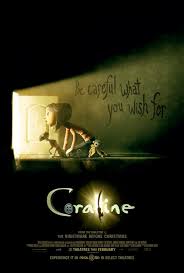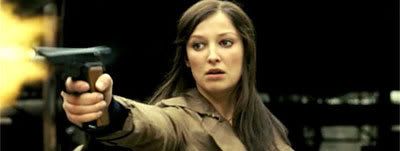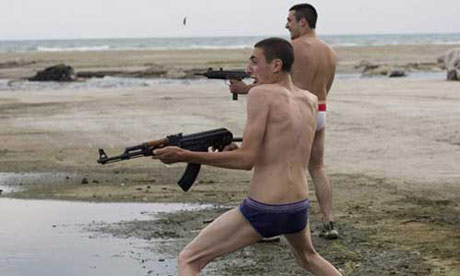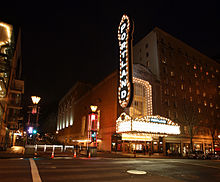Well, THAT was fun.


The official opening night of the Portland International Film Festival is usually a pretty big to-do in Oregon terms, but when you throw in a world premiere complete with stars on a red carpet it gets kee-ray-zee. Not only was it the world premiere, but it's the first feature from Laika Studios, centered here just outside of Portland and owned by Nike's Phil Knight. Phil and his son Travis, who was one of the lead animators on
Coraline, were both there as were actors Dakota Fanning, Teri Hatcher and Robert Bailey Jr. who lent their voices to the characters, director Henry Selick, author of the book Neil Gaiman, and a few celebrities who weren't involved with the production at all such as PIXAR's Brad Bird and Portland's own Gus Van Sant and a slew of our local comic book celebrities like Craig Thompson and Dark Horse's Mike Richardson as well as over sixty of the three-hundred Laika artists and technicians who brought
Coraline to life. All of this is definitely unusual for Portland, and as Phil Knight remarked before the film screened he never thought he'd ever hear people uttering the phrase, "I flew up to Portland from L.A. for the premiere".




The party afterward was held in the nearby Portland Art Museum, and some of the elaborate sets and puppets from the production were featured throughout. Quite the night for hobnobbing and it was first class all the way around. Now for the movie itself...

 Coraline
Coraline
A dark and visually jaw-dropping kid's movie that is probably much too scary for kids,
Coraline is the story of a little girl tempted into a Through the Looking Glass world where the magic wonders mask a sinister purpose. Coraline Jones and her parents have just moved into a new house in Oregon, a spooky old place divided into three separate apartments. The other residents are a pair of sisters, Miss Spink & Miss Forcible, who were semi-famous actresses once upon a time but now devote their time to their dogs and arguing with each other, and upstairs lives Mr. Bobinsky, an eccentric former circus performer who is always busy training his mice for a comeback. It's not too long before Coraline discovers a small door in her living room that has been wallpapered over. She unlocks it and finds a portal to another world. It's a bizarro world where everything seems to be the same, her house her garden, her parents and neighbors, but everything is off. At first the ways in which this otherworld are off are wonderful, from large piles of her favorite food cooked to perfection, to a magical garden that comes to life and elaborate productions put on by her otherneighbors. But every living thing has buttons for eyes, and while there is all kinds of fun to be had there Coraline begins to realize there is a price to the magic. But will she be able to summon enough courage and use her wits to outsmart the evil force that wants to imprison her in the otherworld forever?

In an age of computer animation
Coraline is a throwback: an elaborate stop-motion production, and knowing that every character - Hell every blade of grass - is a physical object makes the end product that much more amazing. It's also in 3-D. I hadn't been to any of the recent 3-D features the past couple years, but the effect in
Coraline is quite amazing. From the opening credits onward the audience was audibly ooohing and aaawing. Among the voice talents Dawn French and Jennifer Saunders (
"Absolutely Fabulous") as the two aged former actresses and Ian McShane (
"Deadwood", Sexy Beast) as the insane Russian acrobat who live in the other two apartments of the old house really steal the show, but everybody does well including Dakota Fanning in the title role, Teri Hatcher and John Hodgman as her parents, and the deep baritone of Keith David as a helpful feline. The music by Bruno Coulais is appropriately creepy like a calliope from Hell, though it is one brief song written by They Might Be Giants sung by Coraline's otherfather that is the most fun and memorable. Technically speaking
Coraline is an A++ wonderment, and that alone makes it worth seeing on the big screen, especially in a 3-D theatre. Director Henry Selick, who exploded onto the scene with
The Nightmare Before Christmas (1993) and
James and the Giant Peach (1996) before falling with the annoying dud
Monkeybone (2001) has made his most ambitious and beautiful picture yet. The visual feast is so lush that you could probably see this four or five times in a row and find new bits of creativity packed into the nooks and crannies of every frame. The story itself, a variation on
Alice in Wonderland and
The Wizard of Oz not to mention
Beetlejuice, isn't quite as inventive or revolutionary as the visuals with a bit of an awkwardly unengaging introduction to the characters, and some of the darkness is surely going to be too intense for younger kiddies, but for those of us kids who never really grew up there is much to delight to.
GRADE: B+




































